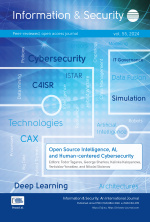Internet, Civil Society and Global Governance: The Neglected Political Dimension of the Digital Divide
Source:
Information & Security: An International Journal,Keywords:
Digital divide, civil society, global governance decision-making, grass-roots empowerment, plurality of voicesAbstract:
The author of this essay on the implications of the digital divide for civil society participation in global governance makes three points. First, he argues that the framing of the digital divide merely in terms of abstract resource/skill inequalities is incomplete and misleadingly detached. The point is illustrated by assessing the implications of the digital divide on the chances for voice and representation of civil society organizations in global governance processes. This analysis leads to the second point, that even in the digital age, it is first and foremost a number of political factors, domestic and international, that determine the chances of civil society organizations to participate in global governance decision-making. These political conditions take precedence over digital resource inequities. The primacy of the political is further corroborated by the third point. Looking at the potential of the Internet to further emancipate civil societies in developing countries from Western-established advocacy and lobbying infrastructures it is concluded that a number of—this time exogenous and international economic and regulatory coordinates—crucially shape the chances of a more disintermediated digital voice in global governance. Due to the novelty of the Internet, evidence to support this line of reasoning is still thin. Though somewhat speculative, some arguments are as plausible as the mainstream strands of thinking on the digital divide. The author hopes that this essay will inspire a fresh look at the foundations and implications of the digital divide, a debate, which has for too long been fixated on abstract resource inequities avoiding a more profound but undoubtedly less comfortable look at systemic distortions and political responsibilities.
